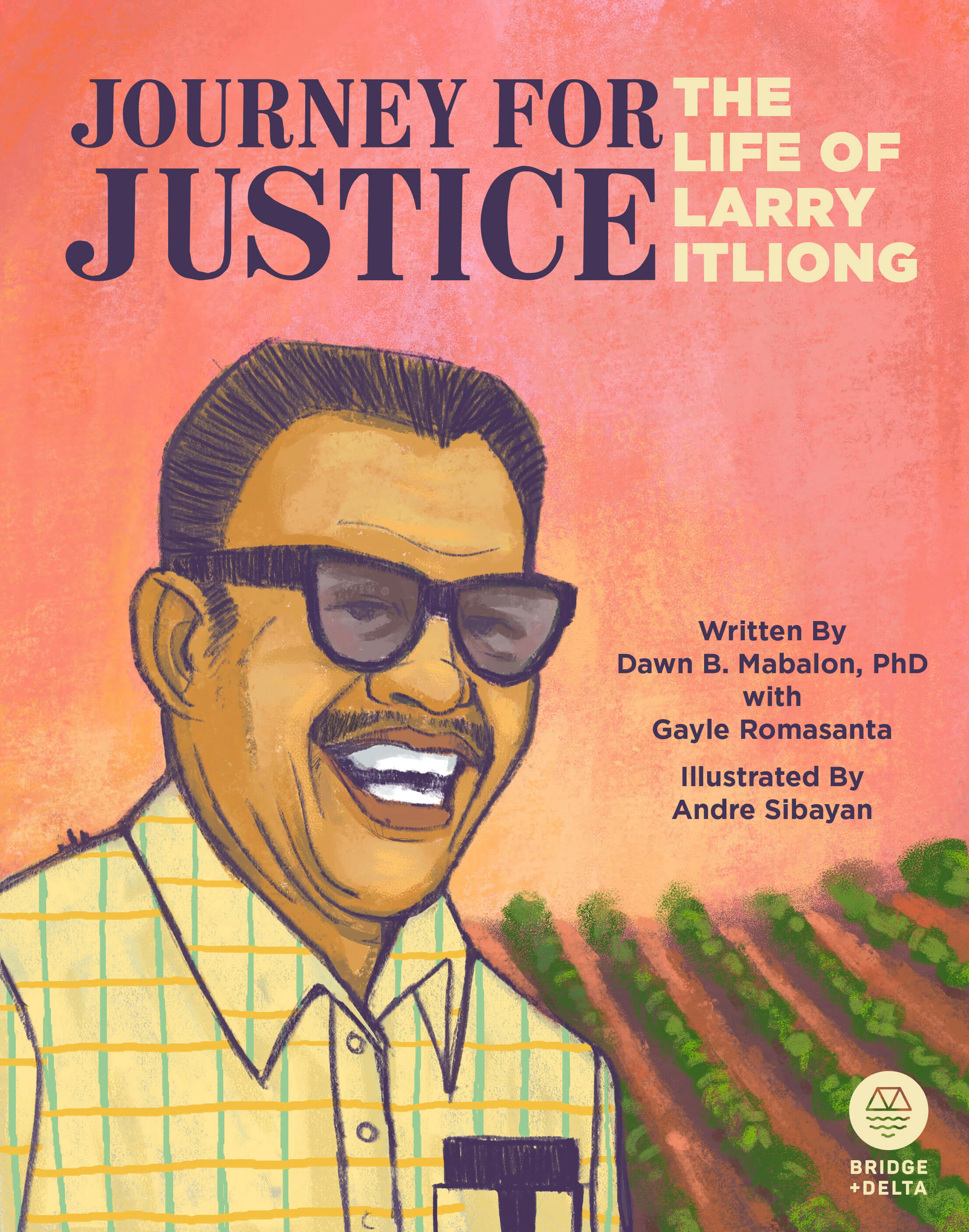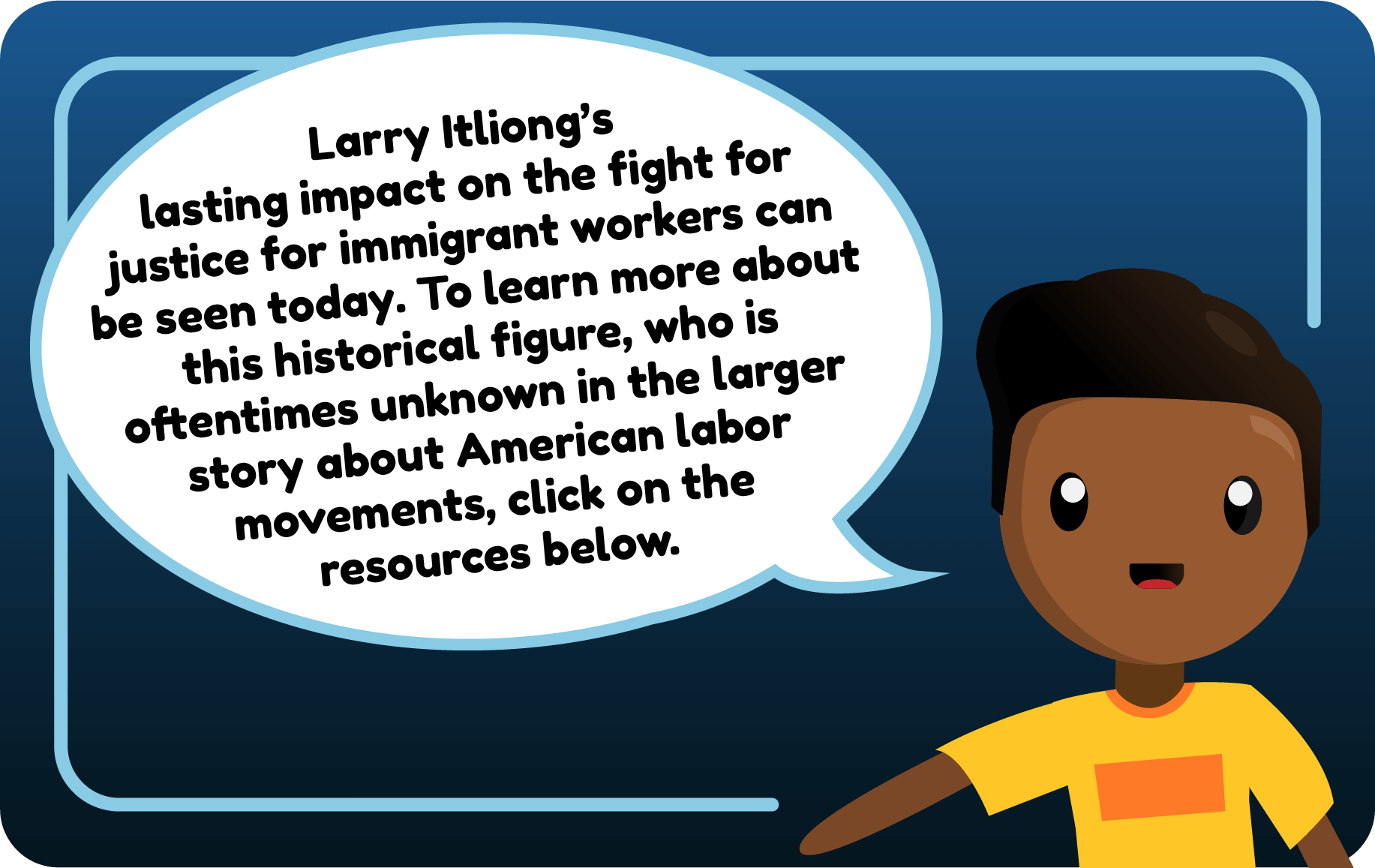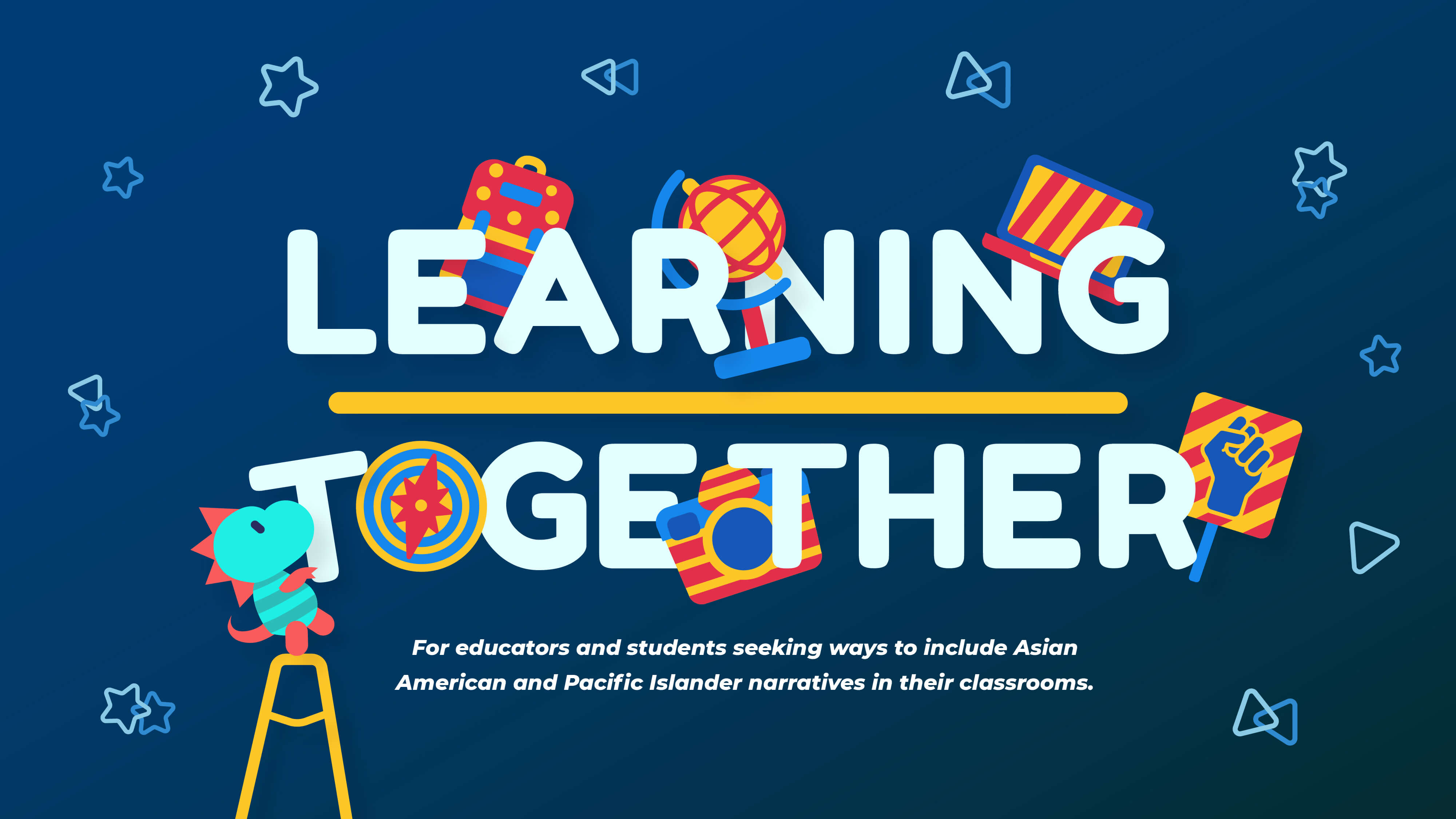
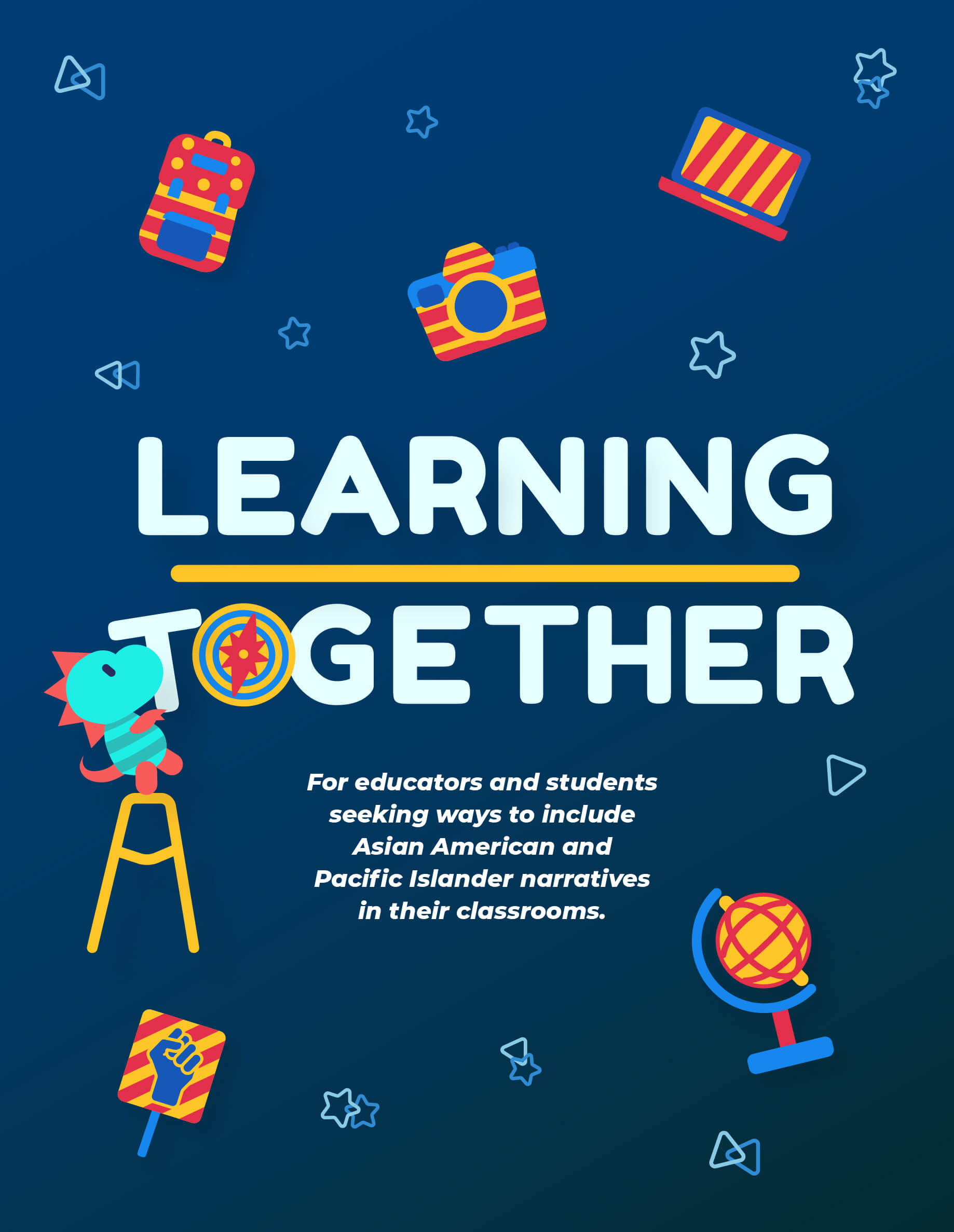
Filipino American History
On this page, you will find information about the importance of Filipino American history, meet two experts, and access links to community-created resources.
Every October is Filipino American History Month, but we think it is important to honor Filipino American history all year round. This page was created to learn more about why October is a “history month” as opposed to a “heritage month,” and why Filipino American history is important to teach and understand in order to broaden and complicate our understanding of American history.
This page includes:
• Q&A with scholars Theo Gonzalves and Robyn Rodriguez
• Book recommendations
• Links to recipes
• Information about the book, Journey for Justice: The Life of Larry Itliong
• Links to the Welga Digital Archive at the Bulosan Center for Filipino American Studies
To explore these resources and learn more about this topic, keep scrolling down this page.
CC photo: Timothy Biley on flickr
Let’s meet Theo Gonzalves, Curator of Asian Pacific American History at the Smithsonian’s National Museum of American History in Washington, DC, with a research specialty in Filipino American history. Theo shared his thoughts on the significance of Filipino American History Month and why it's important to tell a fuller American history.
Last month was Filipino American History Month. What are the origins of this recognition, and why is it important to consider the distinctions between a "history month" and a "heritage month?"
In 1991, the leadership of the Filipino American National Historical Society established October as Filipino American History month. They pointed to research that the “earliest documented proof of Filipino presence in the Continental United States falls on October 1587…” In 2009, the 111th U.S. Congress passed House Resolution 780, recognizing the celebration of Filipino American History Month in October. There is a distinction between a “history” and a “heritage” month, but it’s really only slight. According to the late historian Dawn Bohulano Mabalon, the category of history the broader of the two and encompasses examples of heritage (e.g., cultural expressions): “History is about the events, experiences, and lives of people in our community (in the U.S.) and their impact upon society and the political, cultural and economic events and moments that shape their lives.”
From your perspective, how do history and heritage months promote—and limit—inclusivity?
Events like Filipino American History Month promote the idea that all of our stories matter and that the telling of the past is never complete. We’re always trying to do right by our communities by bringing more of what’s been left out the frame into view. There are a lot of reasons why that’s been the case. A lot of it stems from the fact that much of this history is the history of workers, immigrants, political refugees, students, and more—in other words, folks who usually don’t end up writing their own stories down or having others write about them. The most privileged in any society don’t have this problem. The kind of social, political, and cultural histories that Filipino American History Month tries to tell is usually from the bottom up. Books like Carlos Bulosan’s America is In the Heart tells a collective story of Filipinos coming to the United States in the middle of the Great Depression, scratching their way to make a living and maybe hoping to secure some kind of foothold with education. Or, more recently, we have Gina Apostol’s fantastic novel, Insurrecto, that uses events during the U.S.-Philippine war as a backdrop for a story about a woman’s ability to translate and tell her own story generations removed from that war. The struggles are real and they need care in the telling. And yes, we should take time every October to remind ourselves of these stories, but let’s remember to educate ourselves about Filipino American histories whenever we can.
You are a scholar in comparative cultural studies, with an emphasis on experiences of Asian American and Filipino American communities. If a K12 teacher were to ask you why it's important to learn about—and teach—Filipino American stories, what would you tell them?
It’s never too late or too early to learn about these histories. Asian Americans are the fastest growing racial group in the country. And within that group, Filipinos are one of the largest. Think of this in terms of language. Of the top 10 languages most commonly spoken in U.S. homes, four hail from Asia—Chinese, Tagalog, Korean, and Vietnamese. The Filipino language is the fourth most commonly spoken language in U.S. homes. Learning about Filipino and Filipino American history means we’ll be able to see comparisons and contrasts with the histories of Puerto Ricans, Cubans, Chamorros, and Native Hawaiians. We can think about the student leaders of the Third World Liberation Front at San Francisco State College (now State) in 1968, many of whom were Filipino and Chamorro, who helped to create the first college of ethnic studies. A people’s history of the United States has yet to be fully told. We all have a role to play in the telling *and* we all have a unique story to tell.
Edited for publication.
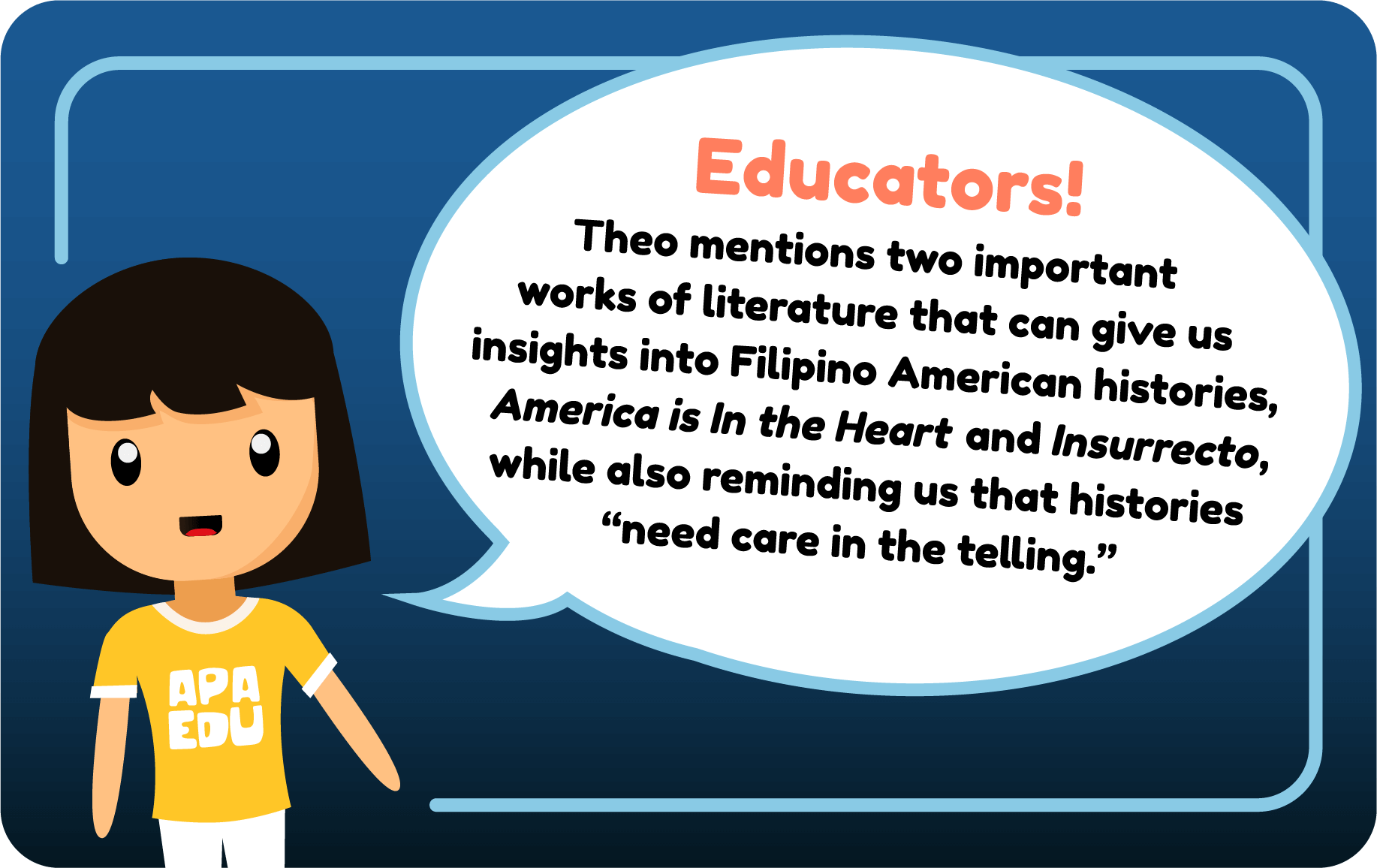
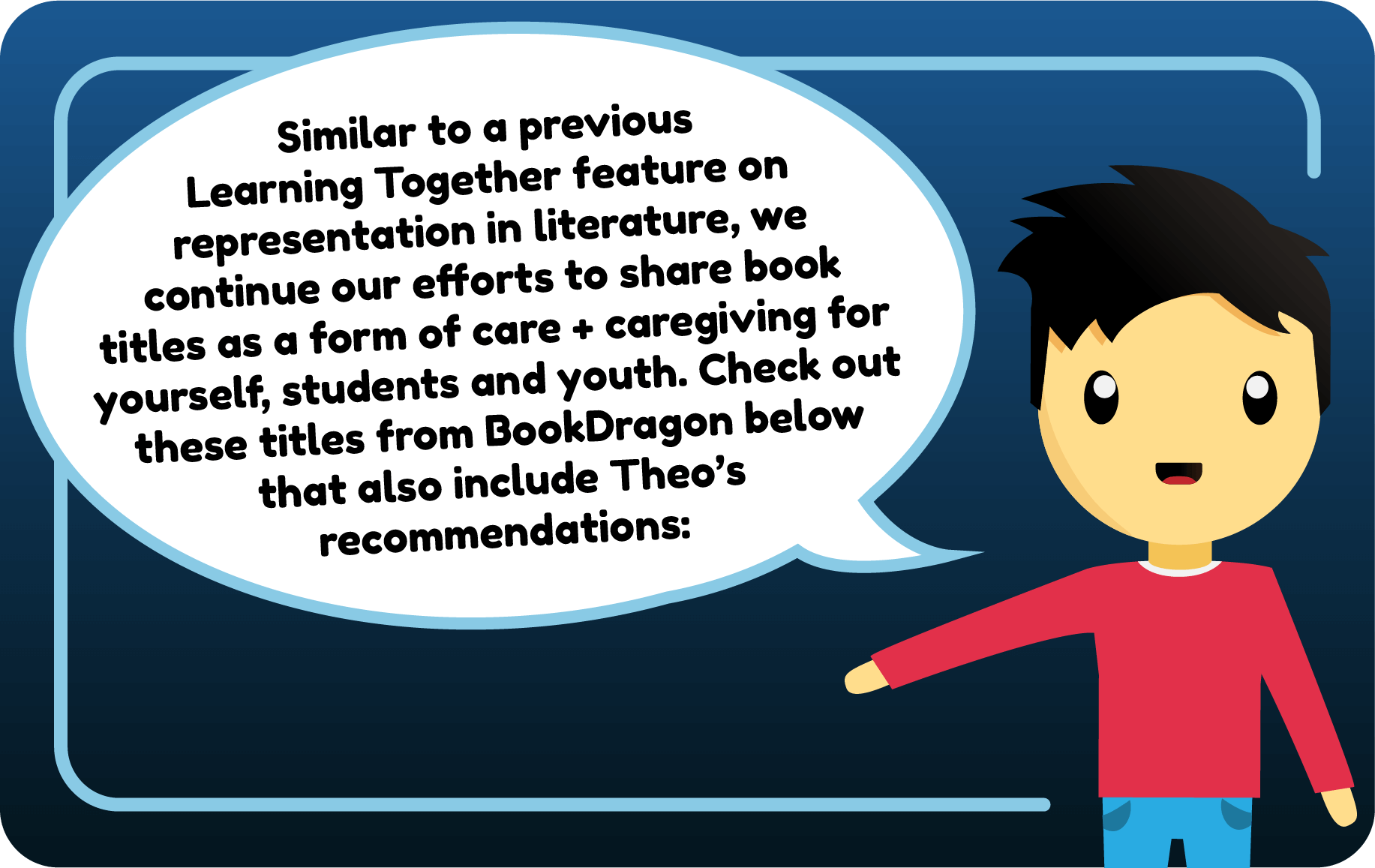
America is In the Heart
by Carlos Bulosan
Dogeaters
by Jessica Hagedorn
Insurrecto
by Gina Apostol
I Was Their American Dream
by Malaka Gharib
Pickles & Tea is a great resource for stories about recipes found in Asian American cooking. To learn more about Filipino American foodways and recipes, click on this link.

Let’s meet Robyn Rodriguez, Professor of Asian American Studies at the University of California Davis, who specializes in globalization, immigration/migration, diaspora/transnationalism, citizenship, social movements, and activism. Robyn shared her thoughts on why Filipino American histories are important to teach in K12 classrooms.
You are a scholar in Asian American Studies with specialties in globalization, immigration/migration, and diaspora. Why might these topics be important for K12 educators to consider as they plan for, and teach, a fuller American story?
Immigration is never just a simple story of "I came here for a better life," which is often what immigrants say themselves and what most, non-immigrants think is the reason for immigration to the United States. Unfortunately, immigration is often due to factors that aren't often a matter of choice like the legacies of colonization, enduring inequalities within and between nations, or war. If we want American children to be conscientious global citizens, it's important to understand the role our country has played in creating and sustaining those conditions even as we learn about the United States as a "nation of immigrants."
Why is it important for students to learn about Filipino American histories in California, and across the country?
Filipino Americans are one of the oldest, largest and fastest growing groups among Asian Americans, they are therefore, an important community to learn about. Just as importantly, Filipino Americans have been at the forefront of social justice struggles that have benefited all people in the United States.
You are collaborating with community members to build educational materials for teachers about Filipino American histories in California. Why is this work important for you, and what do you hope teachers and students will learn from this work?
As a university professor, I worry that there are knowledges that I (and my colleagues) produce that simply aren't being shared as widely as they can be; knowledges that are affirming and uplifting for communities who deserve to know what we have discovered. As a Filipino American who was born and raised in California and who rarely saw myself in the curriculum on U.S. history and often felt like an outsider--only to discover when I was in college that people who share my background contributed to building the state--I think it's important that our stories are also valued part of (the) U.S. (hi)story. Moreover, when children of color see themselves in their textbooks, i.e. when ethnic studies is incorporated into their curriculum, researchers have found that they do better academically overall. I want that for my own children and the children of the future.
Journey for Justice: The Life of Larry Itliong
This children’s book was authored by Dawn Bohulano Mabalon and Gayle Romasanta and dives into the story of Larry Itliong. It is available for purchase here.
There is also an in-depth teacher guide for this book, which can be accessed online here.
In this video about the book, author Gayle Romasanta talks about the historic significance of Larry Itliong and Filipino American community histories as American histories.
